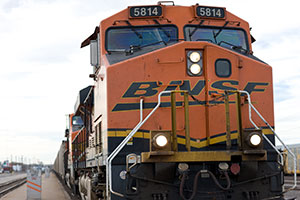Low Rail Traffic Leads to Furloughs at BNSF

BNSF Railway has about 4,800 workers on furlough nationwide, according to a company official.
The furloughs are because 2015 ended with an unusually low number of average weekly rail carloads in the United States, according to data compiled by the Association of American Railroads.
“Our workforce needs are driven by our customers’ freight transportation needs. Customers’ volumes in the near term have come down somewhat from their prior estimates,” Amy McBeth, BNSF public affairs director for South Dakota, North Dakota, Minnesota, Wisconsin and Manitoba, said in an e-mail.
“As a result, we are having to adjust our workforce demand numbers down to match volume and the work required to move that volume,” she said. “As part of that, unfortunately, we are having to temporarily furlough some of our employees at different locations across our network ... [We] are not disclosing breakdowns by region or state.”
She declined to elaborate on how the current number of nationwide furloughs compares with past figures.
AAR data for the week ending March 12 shows a number of commodities with softening volumes. According to a news release from the association, the week’s U.S. traffic totaled 489,177 carloads and intermodal units — 11.6% lower than in the same week in 2015. Intermodal units contain goods that ship in the same container by more than one route.
The most substantial commodity decreases seem to be coal and petroleum, according to the data. It shows U.S. rail traffic of coal down 34.1%, and petroleum and other products down 13.1% from last year.
Cumulatively, the number of carloads for the first 10 weeks of 2016 was down 12.9%, while the number of intermodal units was up 5.6%.
January and February numbers show more than 22,000 carloads nationwide each month.
Year-to-date, grain carloads have only decreased 2.2%.
“[Grain] is moving like it typically would,” Wheat Growers Senior Vice President Roger Krueger said.
That means it’s moving out of the region more quickly than it has in recent years, Krueger said. That’s because it was especially difficult to get grain out of the region in 2013-2014, according to past American News accounts.
Krueger said that although the decrease in oil and coal shipments via BNSF isn’t necessarily good news for the U.S. economy, it does free up more track capacity for moving grain.
The number of grain carloads this year is up substantially when compared with the first nine months of 2013. Numbers for that stretch indicate that between 15,000 to 17,000 grain carloads shipped on average each month.
According to a BNSF fact sheet, the rail company hauled about 900,000 carloads of agricultural commodities last year, including enough grain to supply 90 million people with a year’s supply of bread.
The fact sheet also indicates that BNSF has 44,000 employees nationwide, which means just more than 9% are furloughed.




